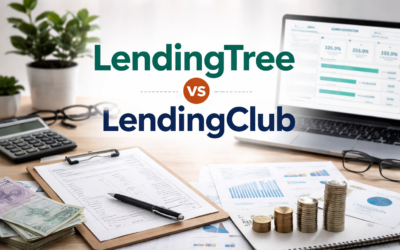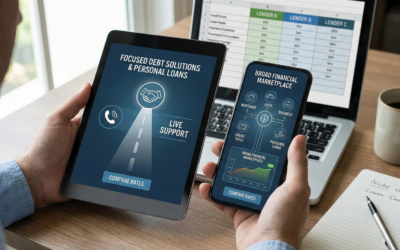The primary difference between a personal loan and a debt consolidation loan has little to do with the loan itself and more to do with how consumers use the funding. The application processes can differ slightly in that when consolidating debt, it’s wise to account for the details of current debt balanced against the pros and cons of consolidation.
Who Are Personal Loans Best For?
Personal loans are best for borrowers with credit scores over 650 who need to fund a one-time or occasional purchase or necessity. While borrowers with lower credit scores can often obtain a personal loan, consideration of higher interest rates or origination fees may come into play.
Who is Debt Consolidation Best For?
Debt consolidation loans are best for borrowers looking to combine multiple debt payments into one, usually to save interest money over the long term or reduce their overall monthly debt payments. Borrowers with higher credit scores will likely realize lower interest rates and origination fees than those with lower scores. However, many lenders will approve debt consolidation loans for those with less-than-excellent credit scores in return for a higher interest rate.
Debt consolidation isn’t necessarily limited to those with good credit. Some lenders offer debt consolidation loans to those with less-than-stellar credit. The difference is that the interest rates on debt consolidation loans for poor credit borrowers are typically higher than for those with good credit. Exercise caution to ensure that debt consolidation will save money in the long run in these cases.
Before committing to a debt consolidation loan, remember that many of the best debt consolidation companies offer a non-commital pre-qualification step that allows you to see what interest rate and loan terms you may qualify for before taking a hit on your credit report.
How Do Interest Rates Work?
Interest rate and APR or annual percentage rate are interchangeable terms. However, there are two important types of interest on debt to understand. The interest you pay on debt is simply the cost of borrowing. Banks and other lenders charge an interest rate when they lend money. The interest rate is part of the lender’s income for assuming the loan risk. The interest rate borrowers pay is part of their payment installment amounts.
The two types of debt interest important when discussing personal loans and debt consolidation are simple interest and compound interest. Personal and debt consolidation loans are typically subject to simple loan interest, while revolving credit, such as credit card debt, often uses compound interest.
The difference between simple and compound interest is where a debt consolidation loan can help save money over paying off credit cards one at a time, and where obtaining a personal loan to cover a large expense can be more beneficial than using credit cards to cover the cost.
Simple interest is calculated by adding the interest rate percentage to the total loan amount and dividing that amount between payments over the loan’s term. Compound interest is calculated by adding interest onto the existing balance at each payment increment. The balance may consist of both principal and earlier accumulated interest. It’s common to pay interest on interest accrued earlier when dealing with compound credit.
Simple Vs. Compound Interest Example
To illustrate, assume a $10,000 simple interest personal or debt consolidation loan with a 24-month term versus a $10,000 compound interest credit card balance, both with a 25% APR, paid over the same time frame with the minimum monthly payment.
Simple Interest Equation
- $10,000 loan at 25% simple interest
- Interest amount = $2,500
- Total loan amount= $12,500
- Minimum payments = $520.83
- Balance after 24 months = $0
Compound Interest Equation
- $10,000 credit card balance at 25% compound interest
- Required Minimum Payment = $300 (3% of balance)
- Total amount paid after 24 months = $7,200
- Interest amount = $1,497.57
- Balance after 24 months = $8,502.43
- Remaining payment duration = 36 months
Personal Loan Vs Debt Consolidation Loan: Which is Better?
Answering the question about which is better, a personal or debt consolidation loan, depends on how you’ll use the funds. Many consumers use a personal loan to pay for unusual expenses and consolidate some debts at the same time. Deciding which financial product will work best for your situation depends on your needs. Another consideration might be choosing between a balance transfer card and a personal loan for debt consolidation.
| Personal Loan | Debt Consolidation | |
| Typical Loan Length | 12 – 144 months | 12 – 60 months |
| Typcial Credit Score Requirements | 650 and higher | 600 and higher, varies widely by lender |
| Typical DTI ratio Requirements | 35% | Varies by lender |
Long-Term Personal Loan Vs. Short-Term Personal Loan
When choosing a personal loan or committing to a debt consolidation loan, the length of time it takes to repay the debt is an essential consideration. Long-term personal and debt consolidation loans over 36 months tend to consist of lower payments but slightly higher interest rates—The monthly payment may be easier to make, but you’ll ultimately pay more in interest over the life of the loan.
On the other hand, loan terms of 36 months and less often feature lower interest rates, which you’ll pay for a shorter time—saving money in two ways. However, the monthly payment will be substantially more than with a longer-term loan.
When making your loan term decision, balance the long-term interest expenditure against the monthly payment you can afford.
Related Article: Can I Get a Home Equity Loan For a Manufactured Home?
How to Choose a Lender
Choosing a personal or debt consolidation loan lender is more than simply calling the bank. A little research is necessary to get the best deal, help save money, and avoid hassles. Online lenders, traditional banks, and credit unions all offer these loans with varying perks, benefits, and drawbacks.
On the other hand, many online lenders offer a pre-qualification step that can estimate your approval odds and loan terms before you commit to a hard inquiry. The other side of that coin is that you may pay somewhat higher interest rates for the added credit score security.
Whichever route you choose, look for specifics of these features when selecting a personal loan or debt consolidation lender:
- Interest rate
- Origination fees
- Loan length term options
- Late payment fees
- Pre-qualification if desired
- Extra perks, such as credit monitoring or account benefits
- Online and local review source ratings
Related Article: Can I Lose My House With a Private Reverse Mortgage?
Best Personal Loan and Debt Consolidation Lenders
While numerous excellent personal loan lenders are available, all featuring their own perks and benefits, we’ve rounded up the best ones according to our strict grading criteria.







